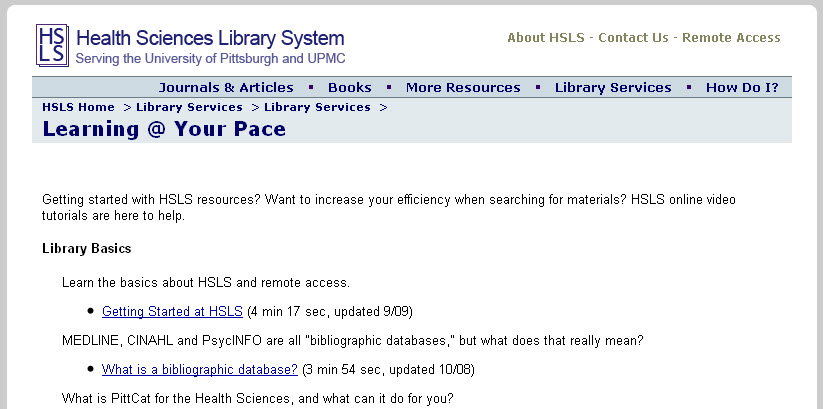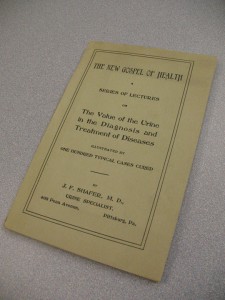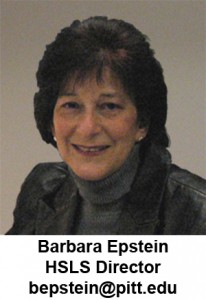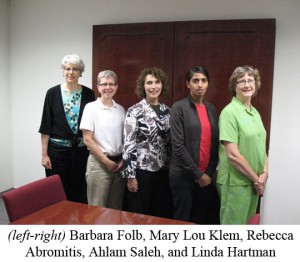HSLS offers classes on database searching, software applications such as Adobe Photoshop, bibliographic management, molecular biology and genetics, and library orientations. For more information visit the online course descriptions.
Classes are held on the first floor of Falk Library (200 Scaife Hall) in classroom 1 and conference room B, and on the second floor in the Computer and Media Center classroom 2. Some classes are also held in the conference room at UPMC Shadyside Libraries. All classes are open to faculty, staff and students of the schools of the health sciences at the University of Pittsburgh and UPMC.
No registration is required for any of these classes. Seating for classes is first-come, first-served, until the class is full. Classes marked with an asterisk (*) qualify for American Medical Association Category 2 continuing education credit.
Class schedules are subject to change. Please consult the online class calendar for the most current information.
HSLS ORIENTATION
Introduction to HSLS Resources and Services at Falk Library
(Meet inside entrance to Library)
Offered upon request to groups or individuals. Call 412-648-8796.
Introduction to HSLS Services at UPMC Shadyside
Offered upon request to groups or individuals. Call 412-623-2415.
Finding Full-Text Articles at UPMC Shadyside
Offered upon request to groups or individuals. Call 412-623-2415.
SEARCHING DATABASES
PubMed Basics* (Falk Library Classroom 1)
Monday, November 22 11 a.m.-12:30 p.m.
Wednesday, December 8 3-4:30 p.m.
Focus on Behavioral Medicine: Searching in PsycINFO* (Falk Library Classroom 1)
Tuesday, November 9 10-11:30 a.m.
MOLECULAR BIOLOGY AND GENETICS RESOURCES
DNA Analysis Tools* (Falk Library Conference Room B)
Wednesday, November 3 1-3 pm.
Protein Sequence Analysis* (Falk Library Conference Room B)
Wednesday, November 10 1-3 pm.
Lasergene* (Falk Library Conference Room B)
Wednesday, November 17 1-3 pm.
Gene Regulation Resources* (Falk Library Conference Room B)
Wednesday, December 1 1-3 pm.
Literature Informatics* (Falk Library Conference Room B)
Wednesday, December 8 1-3 pm.
Sequence Similarity Searching* (Falk Library Conference Room B)
Wednesday, December 15 1-3 p.m.
SOFTWARE TRAINING
EndNote Basics (Falk Library Classroom 2)
(Note: This class is usually full. Please arrive 15 minutes in advance to ensure seating.)
Thursday, November 11 1-3 p.m.
Wednesday, December 8 10 a.m.-noon
Adobe Photoshop for Beginners (Falk Library Classroom 2)
Tuesday, November 2 10 a.m.-noon
Tuesday, December 7 10 a.m.-noon
PowerPoint for Beginners
Wednesday, December 22 10 a.m.-noon (Falk Library Classroom 2)
Wednesday, November 10 11 a.m.-1 p.m. (UPMC Shadyside Libraries)
Advanced PowerPoint for Presentations (UPMC Shadyside Libraries)
Wednesday, November 10 11 a.m.-1 p.m.
PowerPoint for Beginners and Advanced PowerPoint (Falk Library Classroom 2)
Wednesday, November 17 10 a.m.-2 p.m.
The WOW Factor: PowerPoint for Posters (Falk Library Classroom 2)
Tuesday, December 14 10 a.m.-noon
Get It To Go
Journals and More at a Glance: iGoogle or MyYahoo pages * (Falk Library Classroom 1)
Wednesday, November 3 Noon-1 p.m.
Mindmapping – Visual Brainstorming and Organization * (Falk Library Classroom 1)
Tuesday, December 7 Noon-1 p.m.
Lunch With A Librarian
These informal, brown-bag lunches are held in Falk Library Conference Room B. Bring your own lunch. Drinks and dessert are provided. For more information visit the online descriptions.
Searching for Dollar$: Grant Resources on the Web
Friday, November 12 Noon-1 p.m.
Medical Humanities on the WWW
Tuesday, December 7 Noon-1 p.m.
Classes
Why use PubMed? (UPMC Shadyside Libraries)
Monday, November 1 Noon-1 p.m.
Find it Quick (UPMC Shadyside Libraries)
Monday, December 13 Noon-1 p.m.
Thursday @ Three HSLS UPMC Shadyside Libraries Information Series
These informal sessions are held in the Conference Room at UPMC Shadyside Libraries.
Let’s be Creative: Jazz Up Your Fliers and Presentations
Thursday, November 18 3-4 p.m.
Exploring HSLS Databases
Thursday, December 9 3-4 p.m.
CUSTOMIZED CLASSES
Customized classes can be developed for your department, course, or other group.
LEARNING @ YOUR PACE
These online tutorials provide information on getting started at HSLS, focusing on the Web site and popular resources.



 The book includes descriptions of 100 cases illustrating Shafer’s use of urine analysis in the diagnosis and treatment of many illnesses. The catalog of cured ailments ranges from gall stones and jaundice, to ailments such as “tobacco heart.” He assembled these cases with one goal in mind: to share tributes from his patients about the benefits of his diagnostic method. He claimed that the only measurable proof of physician success is a cured patient willing to give testimony about a doctor’s effectiveness. Long before HIPAA regulations protecting patient privacy, Shafer managed to secure his patients’ permission to publish their testimonials to prove his claim. Therefore, all the described cases include detailed observations leading to diagnosis and treatment, and the patients’ testimonials with full names and addresses, so they could be contacted to verify the printed word.
The book includes descriptions of 100 cases illustrating Shafer’s use of urine analysis in the diagnosis and treatment of many illnesses. The catalog of cured ailments ranges from gall stones and jaundice, to ailments such as “tobacco heart.” He assembled these cases with one goal in mind: to share tributes from his patients about the benefits of his diagnostic method. He claimed that the only measurable proof of physician success is a cured patient willing to give testimony about a doctor’s effectiveness. Long before HIPAA regulations protecting patient privacy, Shafer managed to secure his patients’ permission to publish their testimonials to prove his claim. Therefore, all the described cases include detailed observations leading to diagnosis and treatment, and the patients’ testimonials with full names and addresses, so they could be contacted to verify the printed word. Though the calendar year begins in January and the fiscal year in July, the start of classes and students’ return to campus in August always seems like the “real” new year to me. Though we relaxed a bit over the summer, now we’re busy with orientations and new projects.
Though the calendar year begins in January and the fiscal year in July, the start of classes and students’ return to campus in August always seems like the “real” new year to me. Though we relaxed a bit over the summer, now we’re busy with orientations and new projects. Do you have a question about how to search a specific database? Feeling overwhelmed and not sure where to begin researching a topic of interest? Ask for help from your school’s liaison librarian listed below. Liaisons have in-depth expertise in retrieving, evaluating, and managing information.
Do you have a question about how to search a specific database? Feeling overwhelmed and not sure where to begin researching a topic of interest? Ask for help from your school’s liaison librarian listed below. Liaisons have in-depth expertise in retrieving, evaluating, and managing information.